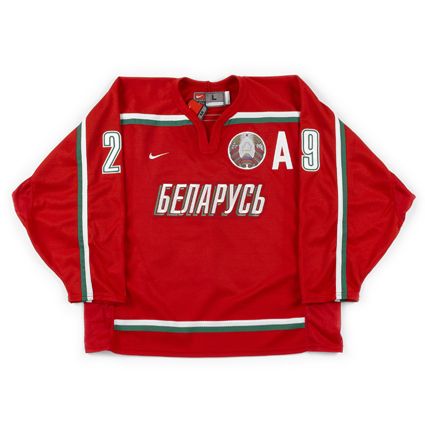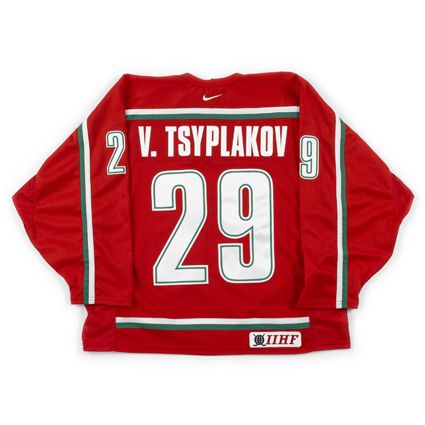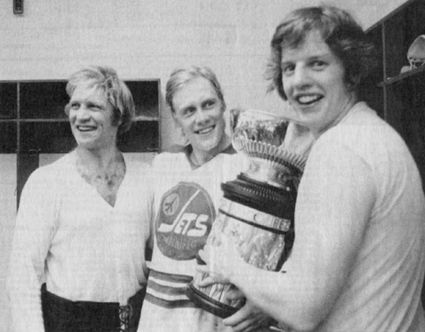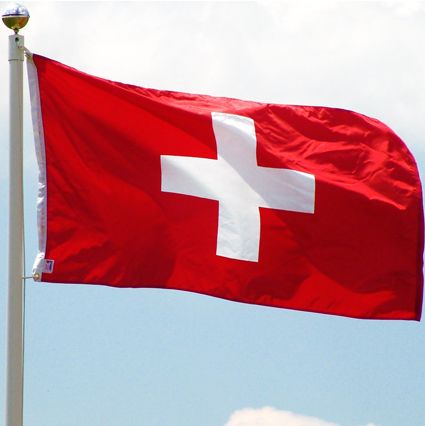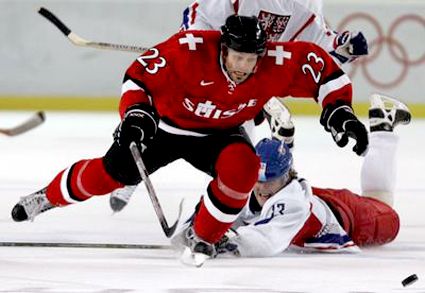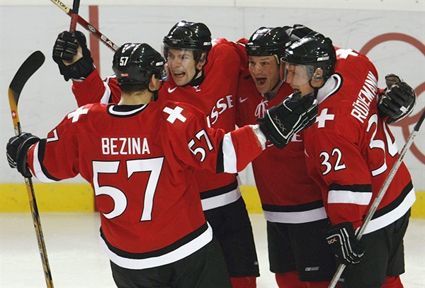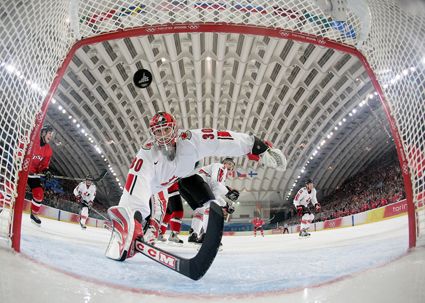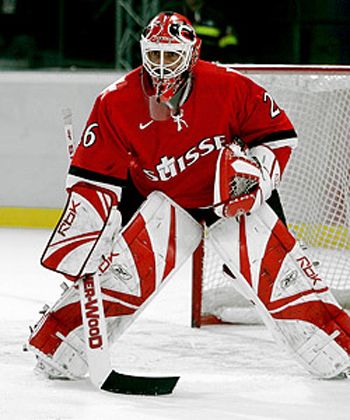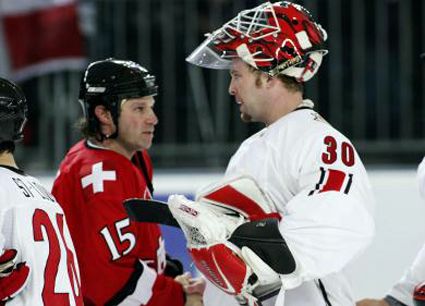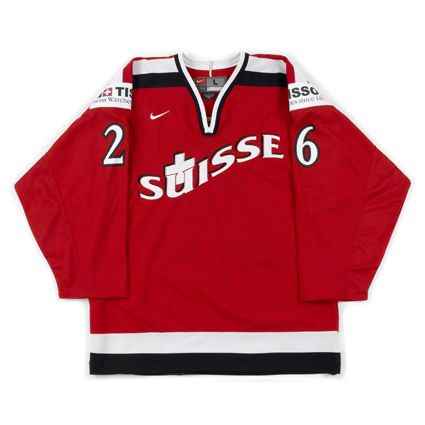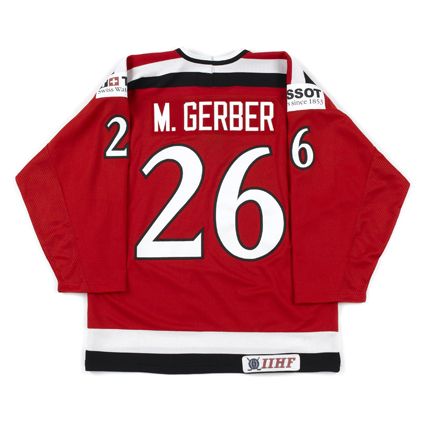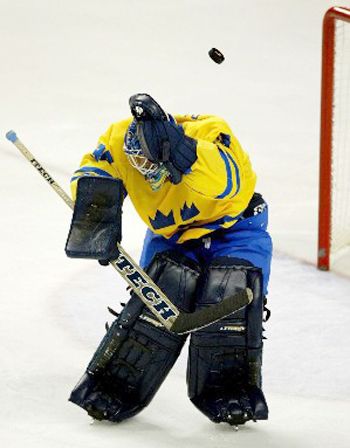
Saturday, February 20, 2010
2002 Belarus Vladimir Tsyplakov Jersey
On this date in 2002, Belarus shocked the hockey world with a stunning upset victory over heavily favored Sweden at the 2002 Olympics in Salt Lake City, Utah.

The format of the tournament called for only the top six teams automatically entered into the final eight, with the remaining eight countries obligated to play in the Preliminary Round, with the two survivors advancing to the Final Round of group play.
The NHL did not even bother to suspend league play for the Preliminary Round, which so severely hampered the efforts of countries like Latvia and Slovakia, whose star players were obligated to stay with their NHL clubs, that the Olympic format in 2006 was changed to prevent such an injustice from happening again.
Belarus started the tournament in Group B of the Preliminary Round with Ukraine, Switzerland and France and only one NHL player on their roster, Ruslan Salei.
They began their group play with a key 1-0 win over Ukraine and were aided when France managed a tie with Switzerland, leaving Belarus alone on top of the standings after just one game.
Belarus defeated France 3-1, while Ukraine downed Switzerland 5-2. All Belarus needed was to win or tie against Switzerland to win the group and advance, but they lost 2-1, while Ukraine tied them in the standings with 4 points apiece after their win over France 4-2, with Belarus advancing due to their head-to-head victory over Ukraine.
The Belarusian's reward for advancing, in only their second Olympics ever, was to be placed in a group with Russia, Finland and the United States.
Things went pretty much as expected with wins for Russia 6-4, Finland 8-1 and the United States 8-1, leaving Belarus last in the group with 6 goals for and 22 against.
Fortunately for Belarus, all teams advanced to the Medal Round of knockout games, and, as the last place finisher in Group B, Belarus was paired with the winners of Group A, the heavily favored Swedes, who had just gone undefeated against Germany, the Czech Republic and Canada.
Sweden started out the game with a Nicklas Lidstrom power play goal at 3:10 of the first period, but then Belarus tied the game with a shorthanded goal by Oleg Romanov less than five minutes later. Dmitry Dudik then scored during a 5 on 3 advantage later in the first period to take the lead.
The confidence that goal gave Belarus showed as they counterattacked aggressively to take advantage of Sweden pushing one defenseman forward into the offensive play. Sweden tied the score after two periods with a goal by Michael Nylander.
The third period began with Belarus taking the lead once more at 2:47 with a goal by Andrei Kovalev and once more Sweden came back when Mats Sundin tied the game at 7:54, leaving 12 minutes to decide the game. Belarus killed off a penalty at the halfway point and Sweden had to do the same at 14:46.
Now down to the final five minutes, Sweden still fully expected to find the goal they needed to advance, but then the unthinkable happened...
Vladimir Kopat came up the ice with the puck, crossed the center red line and let go a 70-foot shot at the Swedish goaltender Tommy Salo, who won the gold medal for Sweden in 1994 when he stopped Paul Kariya's final shootout attempt for Canada. The puck continued to rise as it travelled toward the goal and, as Salo awkwardly jumped up and tried to catch the puck next to his head instead of just reaching up and catching it, the puck hit him in the mask near his neck, bounced up and dribbled into the goal behind him for a 4-3 Belarus lead with just 2:24 to play.

Belarus circled the wagons and kept Sweden at bay for the remainder of the game, including the final 56 seconds with and extra attacker on for Sweden. While Kopat will go down in history as the man who scored the improbable goal, goaltender Andrei Mezin starred for Belarus with 44 saves, keeping them in the game despite being outshot 47-27. "For sure, it is a miracle for us," Mezin said. "But sometimes a gun without bullets can shoot, and that was us. We've made our place in history."
"I don't understand how we could lose against this team. We should have put this team away in the first or second period," Swedish captain Sundin said.
The victory was immediately ranked as one of the top three upsets in Olympic history, along with the United States victory over the Soviet Union in 1980 and Great Britian's defeat of Canada in 1936.
Kopat, who scored the winning goal, was asked, ''Do you believe in miracles?''
''Yes,'' he replied. ''Of course. It was just a shot from the red line and ... well, that's what happened," said Kopat, who seemed as incredulous about the goal as anyone.
Even Salei said afterward, "It was a lucky goal."
Belarus would finish the tournament classified fourth.
Today's featured jersey is a Nike 2002 Belarus National Team Vladimir Tsyplakov jersey as worn during their famous upset over Sweden at the 2002 Olympics in Salt Lake City.
Tsyplakov was originally drafted 59th overall by the Los Angeles Kings of the NHL and played for the Kings in five seasons and parts of two more seasons with the Buffalo Sabres before returning to Russia, where he played an additional four years before retiring.
His final NHL totals were 331 games, 69 goals and 101 assists for 170 points.
Here are the final few minutes of Belarus' shocking upset victory against Sweden in the 2002 Olympics.
Dasherboard: Sweden got off to a 3-0 lead over Belarus before taking their foot off the gas and letting Belarus pull back two goals to make things interesting before Daniel Alfredsson put the game away with a goal with just 11 seconds remaining. The victory in regulation gives Sweden their expected 6 points heading into Sunday's game with Finland, but the two goals by Belarus left Sweden trailing the United States in goal differential by 3 and the Czech Republic by 1.
In the second game of the day, the Czech Republic were already up by a score of 3-0 before MSNBC got around to showing the game following curling (again). Lativa settled down after that and a pair of goals in the latter half of the second period pulled them to within 4-2 and were looking for one more goal to make things interesting. It was not to come however, and the Czechs added an empty netter at the end for a final of 5-2. The win allowed the Czechs to move to the top of Group B with 6 points, 2 clear of Russia. With Russia losing to the Slovaks yesterday (or was it really early this morning?), all the Czechs need is to take Russia to overtime, win or lose, to claim the bye that comes with winning the group.
Finland's 5-0 win over Germany sets up a winner-take-all showdown with Sweden on Sunday, with both teams tied with 6 points. It will be a reprisal of their gold medal showdown from the 2006 Olympics in Torino, Italy. Teemu Selanne moved into first place in all-time Olympic hockey scoring with his 37th point.
Today's games get underway with Norway vs. Switzerland (MSNBC), followed by Latvia vs. Slovakia (MSNBC) and the insomniac game being Germany vs. Belarus (MSNBC).
Switzerland will be favored against Norway and 3 points from a regulation win would likely keep them ahead of Norway, Latvia, Germany and set up a potential Secondary Round matchup with Belarus.
Slovakia's defeat of Russia certainly means they will be expected to beat Latvia and conceivably pass Russia, should they lose to the Czechs. 5 potential points still won't be enough to earn them a bye, so they must focus on earning enough points to stay clear of Switzerland and draw one of the bottom three teams, likely Germany, on the first day of eliminations.
Belarus at least looks capable of scoring a goal now and then, something that can't be said for Germany's "soccer on ice" approach, and they will be favored over the Germans. A win for Belarus would give them a likely meeting with Switzerland on Tuesday, while a loss has them looking at Slovakia - or worse - on Tuesday.
Labels:
Belarus,
Tsyplakov Vladimir
Friday, February 19, 2010
1978 WHA All-Star Bobby Hull Jersey
On this date in 1989, the Winnipeg Jets retired Bobby Hull's jersey #9.
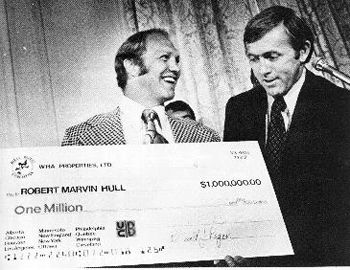
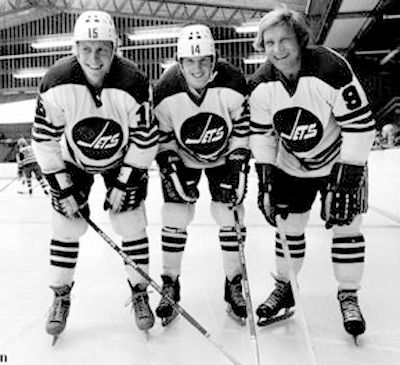
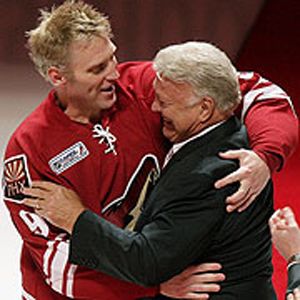
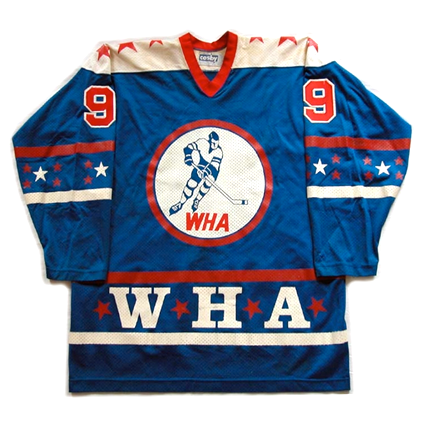
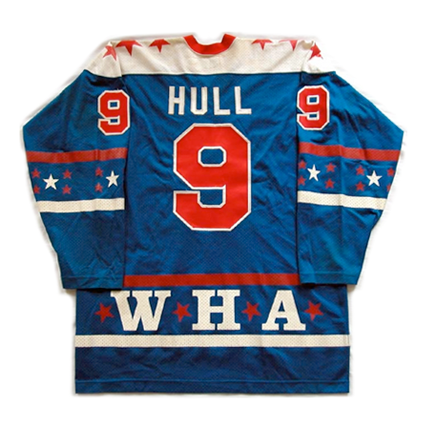


Hull had been a member of the Chicago Black Hawks of the NHL for fifteen seasons when the upstart World Hockey Association came looking for a star player to jump start the league and attempt to buy instant credibility, and found their man in Hull.
Coming off a 50 goal season with Chicago, when Hull jokingly told the WHA he'd jump for a million dollars, the WHA owners and league officials agreed to contribute to the cause and Hull was signed to a ten year, one million dollar contract. The WHA would not last the full ten years.

Once Hull was in the fold, other players soon followed, mainly in search of the higher paychecks offered by the new league, as Gerry Cheevers, Pat Stapleton, Ralph Backstrom, J. C. Tremblay and Rejean Houle also jumped leagues.
Despite an injunction filed by the Black Hawks which kept Hull out of the first 14 games of the 1972-73 season, the damage was done and eventually Hull became a full time Jet and the WHA was off and running.
Hull paid immediate dividends to the league and the Jets, raising the profile of the league and leading the Jets in scoring with 51 goals and 52 assists for 103 points, placing fourth in league scoring as the Jets finished atop the Western Division standings and leading Winnipeg to the Avco Cup Finals. Hull was also named the WHA Most Valuable Player in 1973, but it could be said that he had already earned that distinction by simply signing with the league in the first place!
For the next season, Hull was joined in the league by NHL legend Gordie Howe, who was lured out of retirement in order to play with his sons Mark and Marty in Houston with the Aeros. Hull would top his goal output with 53, but the Jets would drop in the standings and get bounced in the playoffs in four straight by Howe and the Aeros.
The Jets would respond by unleashing the most dynamic line in the history of the league the following season with the arrival of Ulf Nilsson and Anders Hedberg of Sweden.

The trio would light up scoreboards all over the league, with each player topping 100 points, led by Hull's record breaking 77 goals on his way to 142 points and being named the WHA MVP for the second time. His 77 goals were 23 more than his next closest pursuer and broke Phil Esposito's professional mark of 76 in 1970-71. Despite the offensive fireworks, the Jets would somehow fail to qualify for the WHA playoffs.
1975-76 would again see the trio of Hull (53 goals, 123 points), Nilsson (114 pts.) and Hedberg (105 pts.) all top 100 points and the Jets improve 25 points in the standings to capture the Canadian Division title. Once in the playoffs, the Jets would sweep the Edmonton Oilers in 4, oust the Calgary Cowboys in 5 and sweep the Aeros in 4 to capture their first WHA championship and the Avco World Trophy.
Hull was limited to just 34 games of the 1976-77 regular season, scoring 53 points in those games. Nilsson, Hedberg and the remainder of the Jets played well enough in Hull's absence to qualify for the playoffs, and Hull contributed 22 points in 20 games as the Jets returned to the finals to defend their title but lost in seven games to the Quebec Nordiques.
Hull would come roaring back the following season of 1977-78 with a 117 point campaign that included 46 goals as the Jets finished in first place during the regular season of the now failing WHA, which was down to one division of seven clubs after having 12 in the league in the previous season.
The Jets would defeat the Birmingham Bulls in five games to advance to the finals where they would demolish the New England Whalers in four straight games by outscoring the Whalers 24 goals to just 8 to capture their second championship.
Hull was limited to only four games in 1978-79 and played 18 games for the Jets in 1979-80 after their absorption into the NHL before being traded to the Hartford Whalers where he was teamed with Gordie Howe for the final nine games of his career.
Hull would finish his WHA career with 411 games played, 303 goals and 335 assists for 638 points (in essentially six full seasons) and two championships and second in league history for goals scored and third in points.
The Jets would play in the NHL from 1979 to 1996 before relocating to Phoenix, Arizona. Years later his son Brett would be signed by the Coyotes, who un-retired Bobby's #9 so Brett could wear his father's number. Coming after a year off following the NHL lockout season in 2004-05, Hull was no longer up to the task and retired after only playing five games, whereupon #9 was retired once more.

Today's featured jersey is a 1978 WHA All-Star Bobby Hull jersey as worn by Hull in a contest where the defending champion and host Nordiques played a team of WHA All-Stars from the remaining seven clubs, a game won 5-4 by Quebec.
The first three WHA All-Star Games in Quebec, St. Paul and Edmonton were played in the traditional East vs West format before a change to Canada vs. the USA in 1976 for the game in Cleveland.
East vs. West returned for 1977 in Hartford before the 1978 game with the defending champions taking on the All-Stars from the remainder of the league due to the shrinking league's one division format for 1977-78.
In the league's final season, the All-Star festivities featured a team of WHA All-Stars in a three game series versus Dyanamo Moscow from the Soviet Union, which was swept by the WHA with scores of 4-2, 4-2 and 4-3 in Edmonton.


Our first video is a real treat, highlights of a 1972-73 Winnipeg Jets game against the Chicago Cougars, in which Hull scores goals 50 and 51. Take note of the Jets first season uniforms with the original Jets wordmark as the logo, rather than the familiar round logo they would adopt in time for their second season, and the white nameplates with red lettering.
Fast forward to 1975 as Hull, now teamed with Hedberg and Nilsson, scores twice against the Aeros.
Finally, here is an interview with Hull on the occasion of the Jets retiring his jersey #9 in 1989.
Dasherboard: The United States got the job done yesterday against Norway, but took their time getting themselves some much needed extra goals to improve their important tie-breaking goal differential with three goals in the final six minutes of the game. The US now stands with the full 6 points possible after two games with two wins in regulation and a +7 differential.
Switzerland did themselves a mighty favor in the newest, best game of the tournament, by taking Canada all the way to a shootout on the fourth anniversary of their upset over Canada in Torino, Italy. Throughout the third period, we kept wondering where was Paul DiPietro when Switzerland needed him? The point they earned in the standings could be what separates them from teams like Slovakia, Germany and Belarus when it comes time for seeding the teams into the Secondary Round on February 23rd. Switzerland's goal differential now stands at a -3, however we think it's rather unfair to count losing in the shootout as a goal against when figuring out the differential.
By giving away a point in the standings by not winning in regulation, Canada drops back behind the United States in Group A and could find themselves with a tougher opponent later on if they are seeded behind the other two group winners should they beat the United States on the 21st. A win against the US, even in overtime or a shootout on Sunday, would tie them with 7 points and give Canada the group and one of the coveted byes into the quarterfinals, based on their head to head meeting with the US.
Should Canada lose to the United States on Sunday, a bye would seem out of the question, as one would expect at least one of the other second place teams to finish 2-1 with 6 points, a situation which will become clearer by the end of the day tomorrow.
The final game of the day, now the newest, best game of the tournament, was a classic battle between Russia and the underdogs Slovakia. Russian Alexei Morozov from the KHL opened the scoring at 5:32 of the second period and it wasn't until half way through the third period until Marian Hossa evened the score for Slovakia. With neither team able to get the game winner in regulation both teams earned a point in the standings as the very entertaining and well played game moved into overtime, which was a great chess match of offensive lines being countered with defensive units by the other side as each team was given credit for three shots on goal.
The game moved into a shootout to determine who would receive the valuable additional point in the standings and both goalies stood tall, while the players had some difficulty keeping the puck under control at times after three games, two overtimes and now two shootouts having been played on the Canada Hockey Place ice during the day.
Frankly, we would have wet ourselves if asked to face the Russian lineup of shooters, especially with the IIHF provision that shooters can be repeated after the first three have shot. It's bad enough to have to have faced Morozov, Alexander Ovechkin and then Pavel Datsyuk, only to then have to face Ovechkin again with the Russians still having the likes of Ilya Kovalchuk, Ovechkin once more and then have Evgeni Malkin still in reserve! If the IIHF is so concerned with hits to the head, why aren't they more concerned about that cruel and unusual punishment?
Despite the fact we would have cried in our mask, Jaroslav Halak stood his ground, aided by the bumpy ice surface and Pavol Demitra, who played a terrific game all night long, came in slow and wide to his left, an unusual twist on his wide right tendencies we have grown used to, and out waited Ilya Bryzgalov, who finally moved left with Demitra only to have the Slovak rotate his stick blade and lift a gentle floater past the Russian netminder, which kissed off the right post and into the far left side of the net for the game winner.

The net result on the current standings shows the United States on top with 6 points over Canada's 5 after two games. Russia's point moves them up to 4. Finland, Sweden and the Czech Republic all stand at 3 with only one game played and each favored to win today as they look to join the USA at the top of the table.
Slovakia's 2 points push them past Switzerland's 1 from earlier today and put them in a good position for a favorable matchup in the Secondary Round, providing they defeat Latvia on Saturday.

Today's games are Belarus vs. Sweden (MSNBC), the Czech Republic vs. Latvia (CNBC) and the late night game Finland vs. Germany (MSNBC). There's no real standout game in the bunch today. Belarus will be looking to repeat their shocking upset of Sweden in 2002, but don't bet on it. Germany's defensive style should provide a close game with Finland and gets the nod as the game of the day.
Labels:
Hull Bobby,
WHA,
Winnipeg Jets
Thursday, February 18, 2010
2004 Switzerland Martin Gerber Jersey
At the 2006 Winter Olympics in Torino, Italy the 12 teams were placed in two groups of six, with the top four in each group advancing to the Medal Round.
Switzerland was not among the top eight ranked teams in the 2004 IIHF World Rankings, and therefore did not have a reserved a place in the tournament, forcing them to participate in the Qualification Tournaments for the chance to earn one of the four remaining spots in the field of 12.
The Swiss were placed in Group A with Japan, Denmark and Norway, and completed their group schedule with a 3-0 record to advance to Torino.
Once in Italy, they were placed in Group A with #1 ranked Canada, #4 the Czech Republic, #5 Finland, #8 Germany and hosts Italy.
The Swiss opened their tournament with a resounding loss to Finland by a score of 5-0 on February 15. The very next day, they pulled off a stunner, defeating the Czech Republic by a score of 3-2. Switzerland opened the scoring at 5:11 of the first period on a goal by Thomas Zigler, but Jaromir Jagr tied the game for the Czechs at 2:55 of the second. Switzerland again took the lead at the midway point of the second on a shorthanded goal by Theirry Paterlini and the period would finish 2-1.
One minute into the third the Czechs pulled level on a goal by Marek Zidlicky. NHLer Mark Streit would score on the powerplay for Switzerland just under six minutes later. After killing off a penalty with nine minutes remaining, the Swiss held off the Czechs behind the goaltending of David Aebischer to complete the upset victory.
Two days later, on this date in 2002, the Swiss would face off against the top ranked Canadians.
Sixty minutes later, the greatest Olympic upset in Swiss hockey history was complete.
Paul DiPietro scored the first goal at 18:19 after Canada had gone 0-5 on the powerplay during the first period.
The second goal came while Canada was down two men after penalty calls just 47 seconds apart. DiPietro capitalized on the golden opportunity just 10 seconds into the two man advantage at 8:47 of the second to put the Swiss up by two, but with the crowd still expecting the Canadians to come roaring back at any moment.
The second goal came while Canada was down two men after penalty calls just 47 seconds apart. DiPietro capitalized on the golden opportunity just 10 seconds into the two man advantage at 8:47 of the second to put the Swiss up by two, but with the crowd still expecting the Canadians to come roaring back at any moment.
The Swiss started the third having to kill off a Canadian powerplay three minutes into the period, which they did successfully. Then Martin Gerber's controversial save on Rick Nash while on the powerplay prevented Canada from not only scoring their first goal that many felt was inevitable, but also robbed Canada of some much needed momentum that a goal would have certainly generated.
Canada would have an opportunity to go on the powerplay one final time with exactly two minutes remaining, only to have a penalty called against them just seven seconds later, negating Canada's last, best chance.
The frustrated Canadians would finish the game 0-11 on the powerplay and, as hard as the shutout loss was for the Canadians to grasp, what made it worse was that the goal scorer DiPietro was born in Canada! Gerber had 49 saves for the Swiss, who fielded a team with just two NHL players on their roster and managed only 18 shots in the victory.
Today's featured jersey is a 2004 Switzerland National Team Martin Gerber jersey as worn during the 2004 World Championships.
Gerber began his career with several seasons in the Swiss league and one in Sweden before joining the Mighty Ducks of Anaheim. After two seasons there and the lockout season of 2004-05, Gerber would join the Carolina Hurricanes and get his name engraved on the Stanley Cup, the second Swiss player after fellow goaltender David Aebischer to earn the honor.
In the 2008-09 season Gerber would move to the Ottawa Senators for two seasons. During the third season in Ottawa, Gerber would be traded to the Toronto Maple Leafs. For 2009-10, Gerber signed a contract with Atlant Moscow of the Russian KHL.
Here is Gerber making an astounding, and controversial, save against Rick Nash during his shutout of the Canadians during the 2006 Olympics.
And finally, the last minute of the game as the Swiss players celebrate their upset victory, something they will be looking to repeat in Vancouver.
Dasherboard: Once again, the favorites took care of business on Day 2 of the Olympic hockey tournament as Finland rolled over Belarus by a score of 5-1, a larger margin than we anticipated. The best dressed game of the tournament saw Sweden defeat Germany 2-0 in a typical German low scoring "soccer on ice" game, as the Germans do what they can to keep the games close and the score low, hoping to capitalize on any mistakes by their opponents. In the best game of the tournament so far, the Czech Republic defeated Slovakia 3-1 in the first game where the outcome was in doubt going in. There was a buzz in the air as the teams played some fast paced hockey during the first period and Jaromir Jagr did his best to remind everyone in North America that he's still alive and well by scoring the game winning goal.
Today's games are the United States against Norway (USA) followed by Switzerland versus Canada (CNBC) in Group A, and the game of the day and your night owl game, a Group B matchup between Slovakia and Russia (CNBC), with Russia having the advantage of an extra day of rest.
Both the US and Canada are expected to win, although history suggests that Canada not look past Switzerland, another team that realizes it's limitations and will play to keep the score low and the game close, hoping that Jonas Hiller in goal can steal one for the Swiss, or at least get them to overtime which would gain them a point in the standings which would help their final seeding for the Secondary Round.
Like Switzerland, Slovakia will be of course looking to win the game, but taking the Russians to overtime would gain them a valuable point in the standings.
Labels:
Gerber Martin,
Switzerland
Wednesday, February 17, 2010
1986-87 Los Angeles Kings Luc Robitaille Jersey
Born on this date in 1966, Luc Robitaille was not drafted until the ninth round, 171st overall, by the Los Angeles Kings in 1984, mainly due to concerns about his skating ability.
Still, Robitaille dominated in junior hockey, scoring 149 points in 64 games in 1984-85 and was then named Canadian Hockey League Player of the Year following the 1985-86 season in which he scored 68 goals and 123 assists for 191 points in just 63 games, an average of over three points per game.
He was impressive in his rookie season in Los Angeles in the 1986-87 season, averaging over a point per game with 84 points from 45 goals and 39 assists in 79 games. His accomplishments were recognized when he was named the winner of the Calder Trophy. The following season he would reach the 50 goal plateau for the first time, with 53, and surpass 100 points as well, finishing with 111.
After four more very consistent seasons with at least 44 goals and 91 points, he would have his career best season in 1992-93 with 63 goals and 125 points, as well as his only 100 penalty minute season as the Kings would reach the Stanley Cup Finals for the first time in franchise history. During the playoffs, Robitaille would add 22 more points in 24 games.
After one more season with the Kings, Robitaille was traded to the Pittsburgh Penguins for the strike shortened 1994-95 season. His stay in Pittsburgh was brief, and he was moved to the New York Rangers where he would play for the following two seasons.
Another trade saw Robitaille back with the Kings for the second time. Injuries would limit Robitaille in the 1997-98 season but he would return to play a full season of 82 games in 1998-99, which included scoring his 500th goal in January. The return to familiar surroundings in Los Angeles would see a resurgence in his scoring, as he would put up consecutive season's of 74, 74 and 88 points, his highest totals since 1994.
He would sign a two-year free agent contract with the Detroit Red Wings for the 2001-02 season at a lower amount than he could have made elsewhere, but calculated that Detroit offered him the best chance to finally win the Stanley Cup, which in fact happened at the end of his first season with the Red Wings in which he contributed 30 goals and 50 points.
After his second season in Detroit, Robitaille would once again return to the Kings to close out his career. In 2003-04 he would play in his 1000th game in a King's uniform. During his final season of 2005-06 he would score a hat trick on January 19th to pass Marcel Dionne's franchise record as the leading goal scorer with 550.
All told, Robitaille played in the purple and gold jerseys of his rookie season, the black, white and silver jerseys adopted upon Wayne Gretzky's arrival in 1988, which were worn until his return in 1997-98 for his second stint with the Kings. 1998-99 saw the Kings adopt their newest look with their black, white and purple jerseys with metallic silver. By the time he returned to Los Angeles for the third time, the Kings had swapped colors and logos on primary and alternate jerseys, giving Robitaille a final total of ten different Kings jerseys worn, and more if you count the minor variations in lettering during the Kings black and white era. He would be the only Kings player to have worn both the original purple and gold colors and the new purple and black jerseys.
Robitaille would conclude his career with 668 goals, an NHL record for left wings, 726 assists and 1394 points, only the second player in NHL history to record 1,000 points after being drafted as low as the ninth round.
His number 20 was retired by the Kings in 2007 and he was inducted into the Hockey Hall of Fame in 2009.
Today's featured jersey is a CCM 1986-87 Los Angeles Kings Luc Robitaille jersey as worn during his rookie season in which he won the Calder Trophy. The jersey sports the addition of the Los Angeles Kings 20th Anniversary patch on the left sleeve.
The Kings were founded in the NHL expansion of 1967 and immediately stood out with their brightly colored gold home jerseys and their unique purple road jerseys at a time when the most daring colors in the NHL were green and orange. The Kings would stick with the purple and gold for 21 seasons before changing their look for 1988.
Plenty of video options today. Too many perhaps. Here's the best of the bunch, with one exception...
First up, a nice tribute video from Robitaille's jersey retirement ceremony with some great action footage.
Next up is a brief tribute video and interview with Robitaille on the occasion of his final game.
Here is Robitaille's acting skills are on display in this TV commercial from 2003 when he was with Detroit.
Speaking of acting, here's media darling Robitaille on the set of the TV series "Bones".
Our next video is Robitaille's Hockey Hall of Fame induction speech from 2009.
Last up is Robitaille's wife Stacia with a black eye and apparently suffering from a concussion as well, as it takes her two minutes to say "So when you're married to a hockey player and walk around like this, it makes people talk." Eight seconds worth of words and two minutes of your life you will never get back. You've been warned, and will not be docked points if you pass on this one.
Dasherboard: The favorites all took care of business on Day 1 of the Olympic hockey tournament as the United States did what they needed to do by defeating Switzerland 3-1 in regulation to earn the full 3 points available, while Canada thumped Norway 8-0 and Russia got their schedule underway by taking down Latvia 8-2. All those teams now get a day off to practice and correct any issues from Day 1 before resuming play on the 18th, except for Latvia, who get two days off.
Today's games are Finland against Belarus (MSNBC) followed by Sweden versus Germany (CNBC) in Group C, and the game of the day and your night owl game, a Group B matchup between neighbors the Czech Republic and Slovakia (CNBC), with reports that Marian Gaborik will not play in tonight's game, as well as Slovakia's next game against Russia as he recovers from the cut on his leg he, while it looks as if they will have the services of Marian Hossa.
Labels:
Los Angeles Kings,
Robitaille Luc
Tuesday, February 16, 2010
2002 Team Canada Mario Lemieux Jersey
Today begins the 2010 Vancouver Olympic Winter Games men's ice hockey tournament.
The opening game will be the United States and Swizterland at 12:00 PM Pacific Time, followed by hosts Canada taking on Norway at 4:30 PM in Group A, while play in Group B kicks off with Russia taking on Latvia at 9:00 PM, which is getting quite late for viewers East of Vancouver.
We personally find it highly annoying that the NHL is concerned about participating in the 2014 Olympics in Sochi, Russia because of the perceived value of participating in an Olympics not in North America and how "the benefits we get tend to be greater when the Olympics are in North America than when they're in distant time zones", yet even with the games being held in North America, the Russians, with the incredibly dynamic trio of Evgeni Malkin, Ilya Kovalchuk and Alexander Ovechkin, three players who the NHL could base their entire marketing of the NHL during the games, find their opening game of the tournament scheduled for 9 PM Pacific time, meaning it won't even be on TV in the largest media market in the world, New York City, but also in all three players NHL home cities of Pittsburgh, Newark and Washington D. C., until midnight local time!
This isn't a one time quirk in the schedule either, as the second Russian game on the 18th is also at 9 PM Pacific time. One would think that they would be able to compress the schedule enough to allow the games to being 3 1/2 hours apart, rather than 4 1/2, in order to allow the late game to begin at 7 PM Pacific time, giving viewers on the east coast a 10 PM faceoff time. Even four hours between games would have the puck drop in the east at 11 PM.
Also, speaking of perceived value and greater benefits of the games being held in North America, did you realize that the key Canada vs. the United States game on February 21st to close out the preliminary round, the one game the league could use to introduce the stars of the NHL to viewers in the United States who don't normally watch hockey, is being shown on that sports hotbed of MSNBC while the main network NBC carries Ice Dancing? Not the highly watched Women's Figure Skating or even the Men's Figure Skating, but Ice Dancing?
And this from a network that the NHL already has a broadcast partnership with! One would think that NBC would be tripping over themselves to put Sydney Crosby on TV (yet again) in order to promote their weekly NHL games. Afterall, doesn't "NBC" stand for "Nothing But Crosby" when it comes to their NHL schedule?
The first key date in the 2010 tournament is "rivalry day" on February 21st when the top two seeded teams in each group all play each other to likely determine who will win each group and receive the important byes directly into the Quarterfinals. The day starts with Russia taking on the Czech Republic at 12:00 PM, the United States plays Canada at 4:45 PM and concludes with Sweden against Finland at 9:00 PM in the late night game New Yorkers Will Only Read About™. While the matchups are stellar, the games will lack a slight edge, as the losers know in the back of their minds that their tournament will continue two days later.
Following the Preliminary Round, things get serious on February 23rd, as the teams ranked 5th through 12th, who have not earned byes in the Preliminary Round, are all paired off in a one day series of knockout games, called the Secondary Round, to determine who advances to the Quarterfinals. This one day hockey orgy begins at 12:00 PM with games following at 4:30 PM, 7:00 PM and 9:00 PM and is a day primed for upsets, with the lower ranked teams fighting for their lives with everything to gain and nothing to lose. A goalie on his day can eliminate a genuine medal contender in a format such as this and is a day of hockey not to be missed!
The process is repeated the very next day on February 24th, when the Quarterfinals occur, another one day game of drama as the surviving teams from the day before take on the top four clubs, who will have been resting up for two days prior. Any of the major teams who slip into the Secondary Round will be looking to correct any earlier slip-ups and keep their tournament alive in another day of elimination games. The matchups on this day will feature winners of each group in the Preliminary Round and all the stars will be out to play, assuming none of them have fallen by the wayside the day prior.
The Semifinals occur on February 26th when the four surviving teams meet to determine which two will play for the gold medal on February 28th.
The highest seeded team in Group A at the 2010 Vancouver Olympic Men's Ice Hockey Tournament are the hosts Canada.
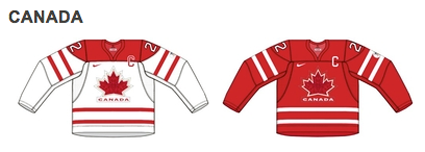
The Canada National Ice Hockey Team is currently ranked 2nd in the IIHF World Rankings.
Based on their status as one of the top nine ranked countries, the Canada was automatically entered in the 2010 Olympic tournament, allowing them avoid the qualification process for teams outside the top nine.
Canada has participated in the Olympics in ice hockey 19 times since 1920, with their best results being gold medals seven times, most recently in 2002 after a span of 50 years since their previous gold in 1952. Canada won the first Olympic gold in 1920 and proceeded to dominate the early events, winning gold in 1924, 1928, 1932, 1948 and 1952. They have also won silver on four occasions, 1936, 1960, 1992 and 1994. A pair of bronze medals rounds out their tally, having been won in 1956 and 1968. Canada withdrew from Olympic competition in a dispute over the rules for amateur players and did not compete in the Olympics in 1972 and 1976.
Canada are regular participants in the World Championships, having first participated in 1920, where they won the gold medal, the first of 11 they would win up through 1939 out of 13 possible. Following World War II, the Canadians would pick up where they left off with eight more golds between 1948 and 1961. Each of the 26 times they would participate in the World Championships from 1920 to 1962 they would capture a medal of some sort, with 19 gold, four silver and a bronze.
Three consecutive fourth place finishes from 1963 to 1965 would end the streak as the Canadian program would enter a doldrums. From 1963 to 1993, which included their withdrawl from international hockey from 1970 to 1976, Canada would earn seven bronze and three silver medals, as well as 11 placings outside the medals and no golds.
1994 to 1997 would see a return to the top, with gold in 1994 and 1997, silver in 1996 and bronze in 1995. A five year medal absence from 1998 to 2002 would be forgotten with back to back golds in 2003 & 2004 and silver in 2005. A fourth place in 2006 was followed by another gold in 2007, the 18th gold in their history, and silver in 2008 and 2009.
As one of the hockey world's top teams, Canada have also hosted the six team Canada Cup five times, winning four, and the eight team World Cup of Hockey twice, winning the championship in 2002.
Canada enters the 2010 Olympics with all 23 players on it's roster from the NHL. It's popular to say that Canada is strong enough and deep enough that they have enough players to field two teams in the Olympics.
Much of the success Canada can attain will depend on the experienced and future Hall of Fame goaltender Martin Brodeur and his partner in net Roberto Luongo. The defense is rock solid, with Chris Pronger and Scott Nidermayer leading the group.
The Canadian forwards are a terrifying collection of talent that should carry this team into the gold medal game, highlighted by Sidney Crosby, Jarome Iginla, Rick Nash, Dany Heatley, Joe Thornton, Jonathan Toews, Ryan Getzlaf and Patrick Marleau. Fifteen of the players have not participated in the Olympics before, and about the only thing that looks to be capable of sidelining the Canadians is pressure from the home media and fans, as the talent is beyond reproach.
With the format for this year's Olympics calling for the top four teams after the Preliminary Round to receive byes into the quarterfinals, the key for Canada will be defeating the United States in their game on February 21st to earn an extra day of rest with a bye into the Quarterfinals. Canada must also avoid a repeat of their upset 2-0 loss to Switzerland in 2006, something we are certain will not be happening again.
Canada will likely earn one of the four byes and draw one of the lower ranked teams remaining in the Quarterfinals. The challenge for Canada looks as if it will really begin with the semi-finals and dealing with the increasing pressure as the tournament progresses and expectations rise, but with several players on the team having captured Stanley Cups and loads of veteran leadership (nine members of the Canadian roster are captains of their NHL teams), expect the Canadians to deal with the pressure just fine and reach the gold medal game on February 28th in front of a frenzied home crowd.
Today's featured jersey is a Nike 2002 Team Canada Mario Lemieux jersey as worn during the 2002 Olympics in Salt Lake City when Canada captured their first Olympic gold medal in 50 years.
Canada started out the tournament slowly, losing their opening game to Sweden 5-2, squeaked by Germany 3-2 and then tied with the Czech Republic 3-3, finishing a lowly third in their group.
They rallied to defeat Finland 2-1 in the Quarterfinals and then had the easy draw of facing Belarus, who shocked Sweden in their Quarterfinal matchup. Canada thumped Belarus 7-2 to reach the gold medal game against the United States, who had a much tougher game in overcoming the Russians 3-2.
The United States broke out on top with the first goal before Paul Kariya tied it and Iginla put Canada ahead after one period.
The score was tied at 2-2 after another goal by the United States before Joe Sakic put Canada ahead to stay with less than two minutes left in the second period.
Through 16 minutes of the third, the score remained the same, but Iginla and Sakic each scored again to put the game out of reach, giving Canada an emotional triumph.
His time at the Olympics took it's toll on Lemeiux, who would play just one NHL game after the games due to a hip injury, which required several pain-killing injections for him to make it through the Olympic tournament.
Here is a look at the jerseys that Canada will be wearing in the 2010 Olympics in Vancouver. The familiar Hockey Canada logo is gone due to the International Olympic Committee rigorously enforcing it's rules forbidding sports federations from using logos used for marketing on jerseys of Olympic teams. This caused quite a bit of strife at Hockey Canada for fears of the loss of revenue generated by the sales of jerseys with the traditional logo by the hockey mad jersey buying public in Canada.
The new jersey features a classic maple leaf shape adorned with a similar tribal tattoo style pattern in the leaf which features aboriginal imagery of the thunderbird, eagle, killer whales, moose, beaver and maple leaves representing past gold medals.
The basic jersey has simple twin stripes around the arms and waist, while the white jersey adds the contrasting red shoulders. The jerseys have a very timeless feel to them and the incorporation of the Canadian imagery in just the main crest is a much more effective use of the technique than that used on the Russian or American jerseys and they should be very popular sellers for the host Canadians with an incredible lineup of star players for customizing options.

Bonus Link: Click here for some desktop wallpapers of historic Canadian Olympic hockey jerseys from 1920, 1932, 1948 and 1964.
Our video selection today is the gold medal game from the 2002 Olympics when Canada defeated the United States to win their first Olympic gold medal in 50 years.
Dasherboard: With the Olympic Games starting today, it's not too late to get your hockey name with our Third String Goalie Hockey Name Generator! Choose from Canadian, Finnish, French-Canadian, Russian or Swedish.
Labels:
2010 Olympics,
Canada
Subscribe to:
Comments (Atom)

